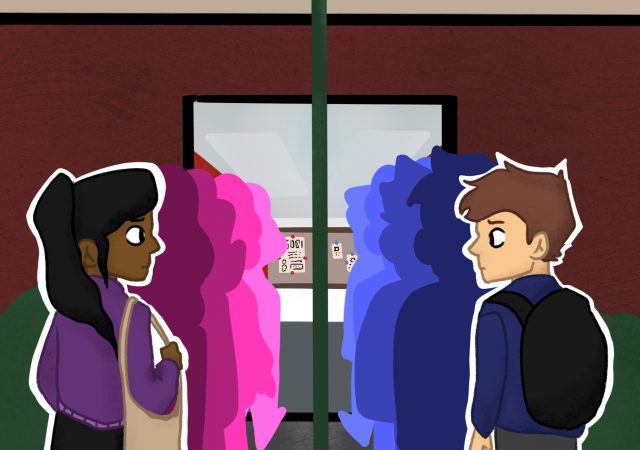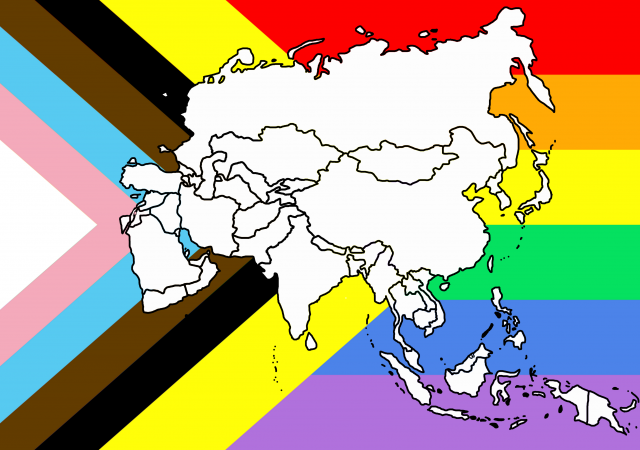On Feb. 7, 2024, Nex Benedict, a transgender, Two-Spirit teen of Choctaw descent, was assaulted in their high school’s bathroom by three girls who had reportedly been bullying them and their friends for the way they were laughing. Benedict went to bed with head pain following the altercation and their mother rushed them to the hospital after they later collapsed. They were pronounced dead on Feb. 8.
Seeking Safety: LGBTQ+ Migrants Fight for Asylum
Whether through proposed restrictions, new waves of immigration, or the continued unjust vilification of migrants, stories of U.S. immigration are constantly circulating in many different forms of media. However, a topic that frequently remains unnoticed by a majority of the public is that of the immigration of LGBTQ+ people and the specific struggles that LGBTQ+ migrants face.
Oklahoma School Bans Gender Change
In 2023, there were at least 32 hate crimes that led to the deaths of transgender individuals. Many trans people may choose not to disclose their trans identity in situations where they feel it is unsafe or unnecessary to do so. Transgender children increasingly face an onslaught of demeaning and even life-threatening pressure to disclose from peers, parents, and, now, educators.
Asia’s Steps Toward Queerness in 2023
Towards the end of October 2023, Japan’s Supreme Court ruled that their long-held legislation requiring transgender citizens to undergo medical sterilization and have “no functional reproductive glands” to legally change their gender is in fact unconstitutional. Even with this change, they must be unmarried and have genitals that present as the “gender” they are trying to identify as. Though there remain some obstacles, this court decision will allow for a life without legal violations of physical autonomy. In the spirit of this queer legislative win for Japanese people, we’d like to highlight how queer folks in other regions of Asia have also witnessed victories and an expansion of dedicated space within the past year.
The Loss of Jesús Ociel Baena, Mexico’s First Nonbinary Magistrate, and What it Means for the Community
On Monday, Nov. 13, reports of the death of nonbinary Mexican Magistrate Jesús Ociel Baena sent shock waves through the LGBTQ+ community.
What “Red, White & Royal Blue” Gets Right About Being Queer in Politics — And What It Doesn’t
“I am the First Son of the United States, and I’m bisexual. History will remember us.”
Casey McQuiston’s debut romance novel “Red, White & Royal Blue” has recently been adapted into an Amazon Prime movie, bringing the love story between the American First Son and the Prince of England to the big screen. The film is a winding tale of controversy and copulation, but ends happily with Alex Claremont-Diaz (played by Taylor Zakhar Perez) and Henry Windsor (played by Nicholas Galitzine) stepping into Alex’s childhood home to start the next chapter of their lives together.
Rainbow-washing Genocide
Every June, corporations unabashedly participate in rainbow capitalism by putting out rainbow logos and pride product lines without taking any meaningful action to support LGBTQ+ causes. We have grown quick to call out such corporations for their performativity, so why don’t we call out other forms of rainbow-washed oppression — especially when it comes to justifying the mass murder of an entire populace?
The Supreme Court on Queer Rights: A Checkered Future
In June 2023, six out of nine Supreme Court justices ruled in 303 Creative LLC v. Elenis that a Colorado graphic designer could legally discriminate against same-sex couples by refusing to make websites for their weddings. The case expands the narrower precedent of Masterpiece Cakeshop v. Colorado Civil Rights Commission, a 2018 decision which ruled that the Colorado Civil Rights Commission could not compel a bakery to sell a wedding cake to a same-sex couple. Both rulings used the First Amendment’s provision for religious freedom as a bludgeon against the LGBTQ+ community’s right to access to public life.
Why Pride This Year?
Picture this: it’s June 28, 1970, nearly a year after the monumental Stonewall riots, and you’re attending the first Pride Parade in New York City. Except it’s not a parade, and it’s not entirely about Pride: it’s the Christopher Street Liberation Day March. Here, we recognize the familiar names of Marsha P. Johnson, Sylvia Rivera, Miss Major Griffin-Gracy, and the lesser known names of the march’s organizers Craig Rodwell, Fred Sargeant, Ellen Broidy, Linda Rhodes, Brenda Howard and many more. Unlike today’s Pride Parade, this march in New York was dedicated to Gay Liberation in the forms of political speeches, demonstrations, and gay visibility.
to live, not just to survive: the queer indomitable spirit
Queerness is often about survival. While Torres is alluding to a space free from discrimination and violence, with the ongoing COVID-19 pandemic, queer survival is being threatened even more. As much as we want to create a “safe space,” there is no true safe space as long as people are dying and becoming disabled from COVID-19. COVID-19 is being swept under the rug by our government despite clear evidence that repeat infections can leave lasting damage in almost every organ in the body.7 Currently, there is also a resurgence of anti-LGBTQIA+, anti-Black, anti-immigrant, and anti-free speech rhetoric and legislation. When queer people are denied the chance to exist, we must find a way to live. By critically examining our past, we can shed light on the present.












